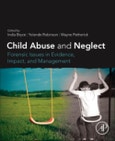Child Abuse and Neglect: Forensic Issues in Evidence, Impact and Management provides an overview of all aspects of child abuse and neglect, approaching the topic. from several viewpoints. First, child abuse is considered from both victimization and offending perspectives, and although empirical scholarship informs much of the content, there is applied material from international experts and practitioners in the field-from policing, to child safety and intelligence. The content is presented to align with university semester timetables in three parts, including 1) Typologies, methods and platforms for abuse, 2) Impacts and prevention, and (3) Issues surrounding recognition and management of child abuse.
This book fills a void in the available university-level classroom-targeted literature, promoting the inclusion of child abuse as a standalone subject within university curricula. As such, readership includes undergraduate and postgraduate students, teachers and wider scholarship, as well as practitioners; including those from psychology, criminology, criminal justice and law enforcement.
Please Note: This is an On Demand product, delivery may take up to 11 working days after payment has been received.
Table of Contents
Part 1 Types of Child Abuse 1. Child Abuse: Types and Emergent Issues 2. Intimate partner violence as a form of child abuse 3. Keeping our eye on sex, power, relationships and institutional contexts in preventing Institutional Child Sexual Abuse 4. Online Child Sexual Abuse 5. Understanding Violent Extremism and Child Abuse: A Psychological Analysis 6. Child trafficking: characteristics, complexities and challenge 7. Gender comparisons of offenders: Males and females who sexually offend against children
Part 2 Impact and Outcomes of Child Abuse 8. Forensic Victimology Assessments in Child Abuse and Neglect Cases 9. Cumulative Harm: Chronicity, Re-victimisation and Developmental Victimology 10. The Pathological Consequences of Exposure to Domestic and Family Violence in Childhood 11. Physical punishment and offending in two successive generations 12. Physical discipline, child abuse and children's rights 13. Understanding the nature and dimensions of child sexual abuse to inform its prevention
Part 3 Management: Responding to Child Abuse 14. False Reports in Child Abuse and Neglect Cases 15. Mandatory Reporting: Managing Disclosure and Information Gathering 16. Virtue Ethics and Good Professional Judgment in Statutory Child Protection 17. Decision making guidelines for the child protection intake phase 18. Eight Core Principles of Neurobiologically-Informed Interventions for Trauma form Childhood Maltreatment 19. Understanding childhood maltreatment and subsequent re-victimization: A Singapore perspective 20. Understanding child maltreatment across ethnic minority communities in Australia: physical abuse, neglect, witnessing domestic and family violence and child sexual abuse 21. Child abuse and neglect and the judicial system: the limits of legal enterprise 22. Public (mis)perceptions of sexual abusers of children and their implications thereof








